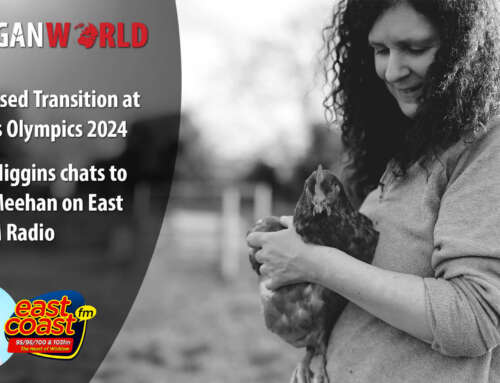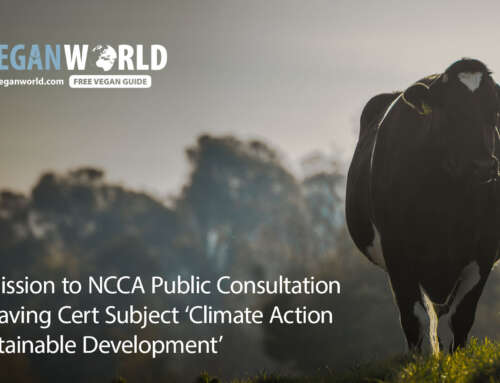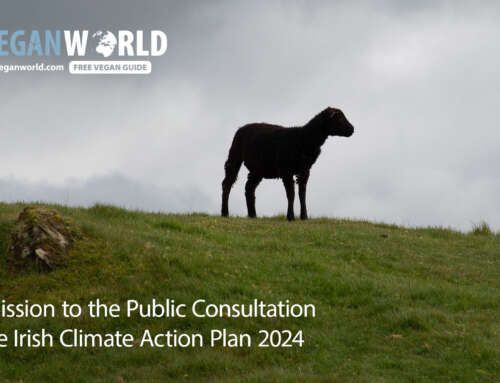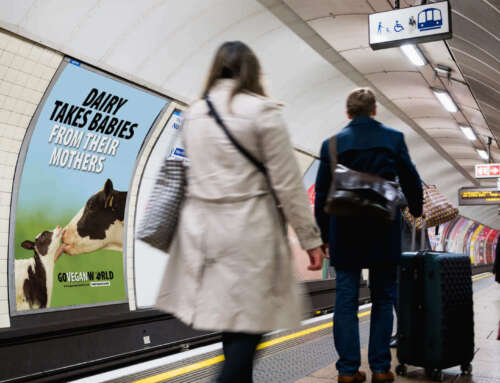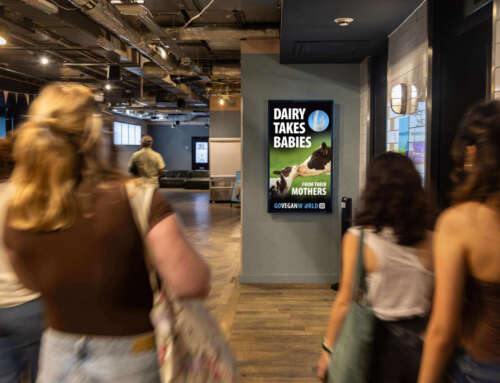16th October 2020
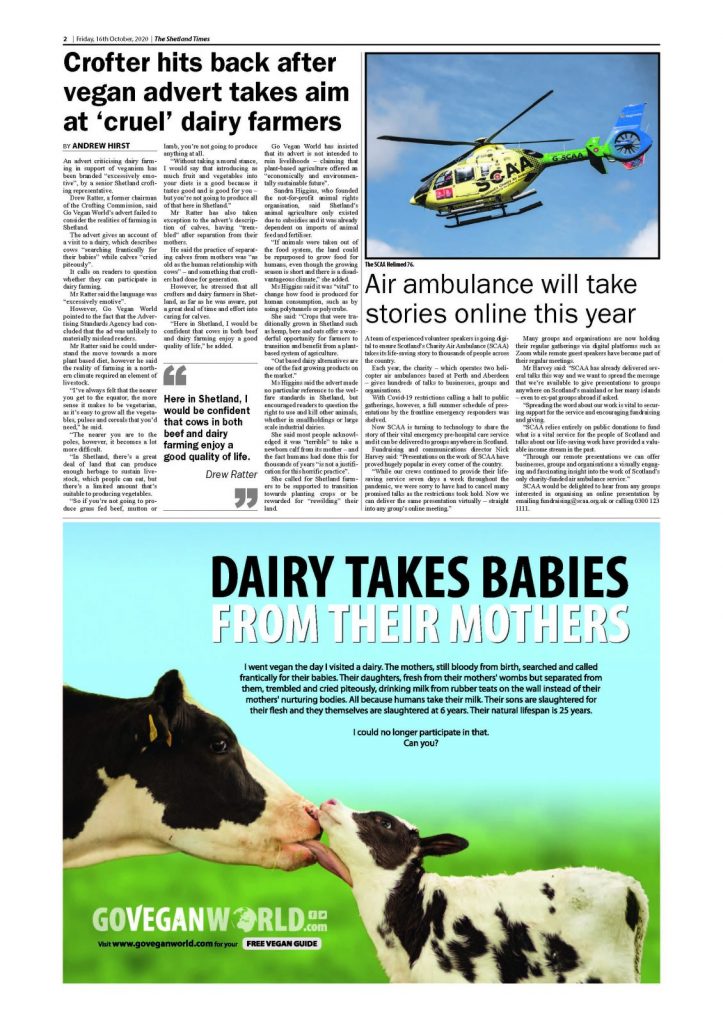
The following is the full interview we did with Mr Andrew Hirst of The Shetland Times, following a battle with the newspaper to have our ad published.
Hi Andrew,
Thank you for your email and for the opportunity to discuss our Go Vegan World ad.
Our ad is not produced with the intention of ruining the livelihoods of dairy farmers. On the contrary, plant-based agriculture offers them an economically and environmentally sustainable future.
It is understandable that food security is a topic of importance to the people of Shetland, especially in the current climate of the pandemic, Brexit and climate change. Food security is already a concern as the UK currently imports 50% of food for human consumption. Studies show that approximately half of Scotland’s total cropland is used to grow crops that are fed to animals rather than for human consumption. Shetland’s animal agriculture only exists as it does due to being subsidised, and it is already dependent on imports of animal feed and fertiliser. If animals were taken out of the food system, the land could be repurposed to grow food for humans, even though the growing season is short, and there is a disadvantageous climate.
It is vital that we are open to changing how we produce food for human consumption. For example, fruit and vegetables can be grown using polytunnels or polycrubs, and hydroponic techniques. Crops that were traditionally grown on Shetland such as hemp, bere and oats offer a wonderful opportunity for farmers to transition and benefit from a plant-based system of agriculture. Oat based dairy alternatives are one of the fastest growing products on the market.
Animal agriculture is unnecessary, immoral and an environmental disaster. All plant foods have a lower environmental impact than animal products. Switching to a vegan diet reduces food emissions by up to 73% and is the single most effective action that individuals can take in their personal lives to avert climate disaster and the collapse of the ecosystem. But we need farmers to produce the food that vegans eat.
There is a presumption that the earth belongs to humans and that we must use its land and resources exclusively for our benefit. The beautiful landscape of Shetland is ideal for rewilding. It belongs to the wild animals of Shetland just as much as to the human population and much of its loss of biodiversity is attributable to animal agricultural practices.
Our ad does not make any reference to the welfare standards of the dairy industry on Shetland or elsewhere. It encourages readers to question our right to use and kill other animals, whether they are kept in smallholdings or largescale industrial dairies. Most people think that cows simply produce milk. They are not aware that they are mammals, like us, and that dairy products are the result of a process of selective breeding, controlled insemination (usually artificial), the separation of newborn babies from their mothers, and the slaughter of young males and of cows whose production slows down and whose bodies become exhausted from the metabolic stress of repeated pregnancy and long term lactation.
These standard, legal practices occur on all dairy farms whether they are small organic farms or large intensive dairy farms. Most people acknowledge that it is a terrible thing to take a newborn calf away from their mother. The fact that we have been doing so for ten thousand years, since we first domesticated cows, sheep, goats and other animals used in the dairy industry, is not a justification for this horrific practice. Even if their babies were not separated from them, we do not have the right to own and use the lives of others on the grounds that they are other animals and not one of us.
Animal products are not necessary for human health. A 100% plant diet is nutritionally adequate and has many health and environmental benefits. Therefore, the practices outlined in this ad are not only very disturbing; they are entirely unnecessary. The ad is a factual description that arouses an emotional response in most people due to its tragic content. When we pay for dairy products, we pay dairy farmers to engage in a practice that most of us would not be able to do ourselves on moral grounds. Most farmers do not enjoy sending animals to slaughter and they are only enabled to do the work they do because they have suppressed their emotions. Farmers are forced to dissociate from their personal emotions to be able to separate calves from their mothers and ignore their cries which go on for days and can be heard by everyone in the vicinity of dairy farms.
Despite the fact that the farmers in Shetland have judged that the language of the ad is ’emotive’, in a landmark decision in 2018, the Advertising Standards Authority (ASA) found the text of this ad to be an accurate description of the dairy industry. It is a public right to know these facts. It is our hope that being made aware of the facts will encourage people to question the ethics of owning the life of an animal who shares our human capacity to feel and value their lives, so that we can exploit and kill her, unnecessarily, for profit, taste, convenience and habit, when living vegan is such a feasible and beneficial alternative.
In summary, our ad questions the human right to own, exploit and kill animals for products that are not necessary for human life. It describes legal practices that are standard in all dairies whether they are small or large scale. Despite being described as ’emotive’, a landmark decision by the Advertising Standards Authority (ASA) in 2018, found the text of the ad to be accurate and substantiated by evidence from the scientific literature. The public have a right to know the facts of dairy production so that they are aware of what they support when they are not vegan.
It is not our intention to damage the livelihood of farmers. On the contrary, plant-based agriculture offers the only sustainable future for human food production. Shetland farmers should be supported to transition from an artificially subsidised industry that is a significant cause of loss of biodiversity and climate change, to planting crops that traditionally grew well in Shetland such as hemp, bere and oats, and by using alternative methods of fruit and vegetable production. Farmers should also be rewarded for rewilding their land which belongs to the wild animals of Shetland as much as it does to the humans who live there.
There are many sources of information to support the people of Shetland to go vegan. They include our Go Vegan World website which has a free guide to veganism, and local groups such as Go Vegan Scotland and Shetland Vegans.
References:
University of Oxford (2018) ‘News: New estimates of the environmental cost of food’ http://www.ox.ac.uk/news/2018-06-01-new-‘estimates-environmental-cost-food
Poore, J., & Nemecek, T. (2018) Reducing food’s environmental impacts through producers and consumers. Science, 360(6392), 987-992.
Harwatt H & Hayek M (2019) ‘Eating Away at Climate Change with Negative Emissions’, http://animal.law.harvard.edu/…/Eat-ing-Away-at-Climate…
https://goveganworld.com/landmark-judgement-animal-rights/
https://goveganworld.com/download-free-vegan-guide/
https://www.goveganscotland.com/
https://veganshetland.wordpress.com/…


